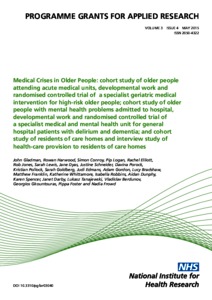GLADMAN, John, HARWOOD, Rowan, CONROY, Simon, LOGAN, Pip, ELLIOTT, Rachel, JONES, Rob, LEWIS, Sarah, DYAS, Jane, SCHNEIDER, Justine, POROCK, Davina, POLLOCK, Kristian, GOLDBERG, Sarah, EDMANS, Judi, GORDON, Adam, BRADSHAW, Lucy, FRANKLIN, Matthew, WHITTAMORE, Katherine, ROBBINS, Isabella, DUNPHY, Aidan, SPENCER, Karen, DARBY, Janet, TANAJEWSKI, Lukasz, BERDUNOV, Vladislav, GKOUNTOURAS, Georgios, FOSTER, Pippa and FROWD, Nadia
(2015).
Medical crises in older people: cohort study of older people attending acute medical units, developmental work and randomised controlled trial of a specialist geriatric medical intervention for high-risk older people; cohort study of older people with mental health problems admitted to hospital, developmental work and randomised controlled trial of a specialist medical and mental health unit for general hospital patients with delirium and dementia; and cohort study of residents of care homes and interview study of health-care provision to residents of care homes.
Programme Grants for Applied Research, 3 (4), 1-410.
[Article]
Documents
14703:104881
![[thumbnail of Porock - Medical crises in older people (VoR).pdf]](https://shura.shu.ac.uk/14703/1.hassmallThumbnailVersion/Porock%20-%20Medical%20crises%20in%20older%20people%20%28VoR%29.pdf)

Preview
PDF
Porock - Medical crises in older people (VoR).pdf
- Published Version
Available under License All rights reserved.
Download (8MB)
|
Preview
Abstract
Background
This programme of research addressed shortcomings in the care of three groups of older patients: patients discharged from acute medical units (AMUs), patients with dementia and delirium admitted to general hospitals, and care home residents.
Methods
In the AMU workstream we undertook literature reviews, performed a cohort study of older people discharged from AMU (Acute Medical Unit Outcome Study; AMOS), developed an intervention (interface geriatricians) and evaluated the intervention in a randomised controlled trial (Acute Medical Unit Comprehensive Geriatric Assessment Intervention Study; AMIGOS). In the second workstream we undertook a cohort study of older people with mental health problems in a general hospital, developed a specialist unit to care for them and tested the unit in a randomised controlled trial (Trial of an Elderly Acute care Medical and mental health unit; TEAM). In the third workstream we undertook a literature review, a cohort study of a representative sample of care home residents and a qualitative study of the delivery of health care to care home residents.
Results
Although 222 of the 433 (51%) patients recruited to the AMIGOS study were vulnerable enough to be readmitted within 3 months, the trial showed no clinical benefit of interface geriatricians over usual care and they were not cost-effective. The TEAM study recruited 600 patients and there were no significant benefits of the specialist unit over usual care in terms of mortality, institutionalisation, mental or functional outcomes, or length of hospital stay, but there were significant benefits in terms of patient experience and carer satisfaction with care. The medical and mental health unit was cost-effective. The care home workstream found that the organisation of health care for residents in the UK was variable, leaving many residents, whose health needs are complex and unpredictable, at risk of poor health care. The variability of health care was explained by the variability in the types and sizes of homes, the training of care home staff, the relationships between care home staff and the primary care doctors and the organisation of care and training among primary care doctors.
Discussion
The interface geriatrician intervention was not sufficient to alter clinical outcomes and this might be because it was not multidisciplinary and well integrated across the secondary care–primary care interface. The development and evaluation of multidisciplinary and better-integrated models of care is justified. The specialist unit improved the quality of experience of patients with delirium and dementia in general hospitals. Despite the need for investment to develop such a unit, the unit was cost-effective. Such units provide a model of care for patients with dementia and delirium in general hospitals that requires replication. The health status of, and delivery of health care to, care home residents is now well understood. Models of care that follow the principles of comprehensive geriatric assessment would seem to be required, but in the UK these must be sufficient to take account of the current provision of primary health care and must recognise the importance of the care home staff in the identification of health-care needs and the delivery of much of that care.
Actions (login required)
 |
View Item |



 Tools
Tools Tools
Tools